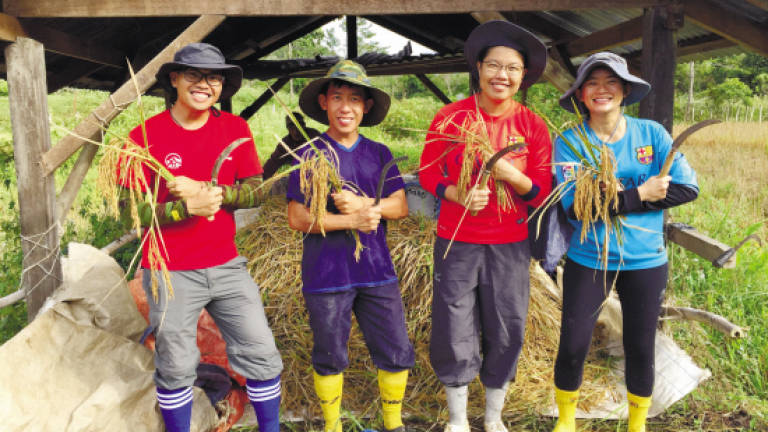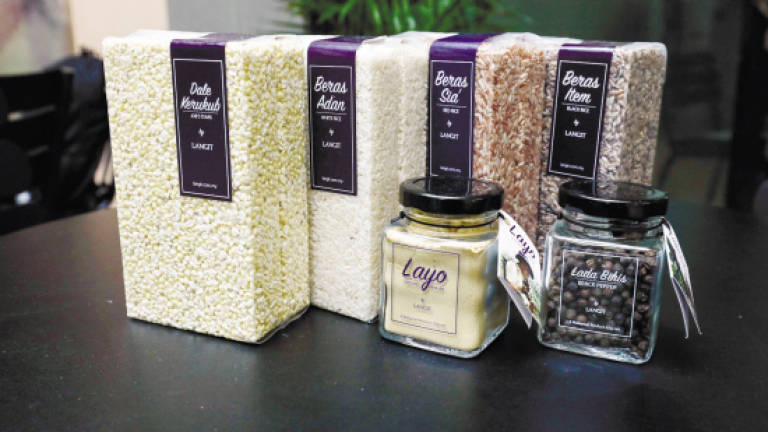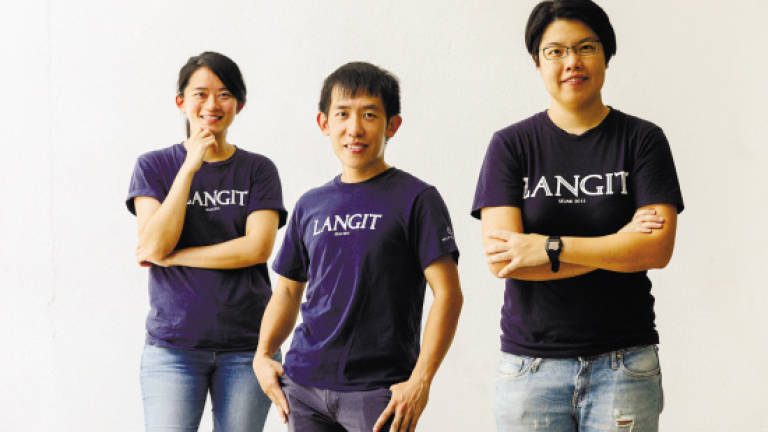Sowing seeds



WHAT do the sun, star, moon and rain have in common? Well, they are actually names given to four special people who made a difference in the villages of Lawas Highlands in Sarawak. The magnificent four – Chan Zi Xiang, Lilian Chen, Melisa Lim and Chia Yong Ling were each given a Lun Bawang name – Aco (sun), Gituen (star), Bulan (moon) and Udan (rain), respectively.
The four elements in the sky in turn formed Langit Collective, a social enterprise that aspires to bring economic empowerment to rural communities and smallholder farmers. The Langit story began with the rice where the four were brought together as colleagues and spent a lot of time doing non-profit work in rural communities in Sabah and Sarawak.
“We stayed with our host families where we had their rice, and we were really surprised that Malaysia still had good, quality grains around. It happened really organically and in 2015, we brought in 30kg of rice, packaged it for Christmas and sold it to see if there were any response – and we got people asking for more,” Chen said.
Langit Collective offers three varieties – Beras Adan (white rice), Beras Sia (red rice) and Beras Item (black rice) which have a soft texture, and each smells and tastes different. Adan is a very fine and small grain and when cooked, it is very fluffy, fragrant and sticky; unlike the white rice we know. Most first timers would say they cannot feel the rice.
What you see in the market is usually brown rice, but Sia is red rice and tastes a little nutty. Meanwhile, Item is very rich with a pandan taste to it. It also has a very sweet smell which will permeate throughout the house when you cook it.
The Lun Bawang community painstakingly plants these varieties by hand and are subsistence farmers, meaning they plant for their own consumption and any surplus will be sold for additional income. But there is no saying if they can sell the rice, and they pay a transporter who charges a certain amount to bring them and their produce down from the highlands.
“If it happens to be the season for rice, the price will decline and their rice are competing against rice coming from Indonesia which can be sold at a very low price. It doesn’t make sense for them to sell at that price point when they have worked so hard for it so some rather not sell. And when we asked what they do with the excess, they say they feed it to the pigs and dogs,” Chen said.
That was the spark that inspired them. Langit is now buying the villagers’ rice at the price they offer and they don’t negotiate further than that. They have a floor pricing system, and they engage with an aggregator in the village who collects, packs and mails the rice to them; per shipment, they are able to bring in about 100kg. The villagers need not worry about transportation or if they are able to sell their rice.
At the time of interview, Chan has gone to the highlands to champion the System of Rice Intensification (SRI) workshop. SRI is a more holistic technique of planting where you minimise certain resources to achieve maximum yield. It is also a natural method that has been used globally.
“We want to eventually bring some impact back to the villages and one of them is training and transfer of knowledge. All these things are present but the villagers don’t have access to it, hence we are attempting to be that reach. We want to also introduce appropriate technologies,” Lim said.
“We want to reduce their labour – how we can make the work easier so it is not so backbreaking. We have tried some methods but some didn’t work. There are a lot of trials and errors, but we are trying to find ways,” Chia said.
“But right now, the challenge we are facing is supply and demand,” Chen said. “The supply depends very much on the weather. If the weather is rainy like the past few months, it is hard for them to dry their paddy. Also the road condition into the area has gotten worse. If it rains again, some of the bridges may get destroyed and it would be difficult for the villagers to come out.”
Recently, Langit Collective has expanded to include Lada Bihis (black pepper) and Layo (ground ginger) and like rice, the smallholder ginger farmers aren’t able to market their excess produce while in the case of pepper, there is no alternative market.
The founders each harbour hope to work on Langit full-time, and there are thoughts of doing it next year. They believe there are so many things they can do in the villages, especially in agriculture.
“When at least two out of three of the products are fully on-ground, that is a sign of growth. We are a slow food that needs tender loving care, and we do need the environment to be in our favour,” Lim said.